Exploratory Careers Landscape Survey 2020: Group Organisers
By Vaidehi Agarwalla 🔸 @ 2021-01-30T10:41 (+21)
Summary
This survey was conducted by the Local Career Advice Network in February 2020. We used the results from this survey to prioritise our Fall 2020 activities. We decided to time cap this write-up so some graphs and content may be unpolished. We encourage you to focus on the content.
- This was an exploratory survey of the career advice landscape to understand the global career advice landscape. A plurality of respondents were national group organisers from Europe. (More)
- Main limitations of the data (More)
- Small sample size
- Sample bias
- Survey design trade-offs
- (Minor) Definition of successful career transition was vague
- Career advice was the main or secondary focus for 60% of respondents and of little or no priority for 40%. The main reason for not being able to prioritise career advice was a lack of competence or knowledge. Organisers who were paid were more likely to prioritise career advice. (More)
- Group organisers were generally not satisfied with the quality of career advice they were able to give.Respondents who prioritised career advice highly were split on satisfaction, while those who didn’t were generally dissatisfied, suggesting that those who do not prioritise career advice may want to. (More)
- Opinions on the career advice landscape (More)
- General and local career advice: Group organisers from other countries generally disagree that existing career advice is adequate for members of their local group and widely agree that local career advice should be improved. This is especially true for organisers outside the US & UK. (More)
- 80,000 Hours career advice: Group organizers widely agree on the usefulness and relevance of the general career guide/book to their group members, but are split about 80,000 Hours’ other services. (More)
- Challenges faced by group organisers (More)
- The top 2 challenges faced by organisers were a lack of good opportunities in their region, a lack of time.
- The 2 least challenging aspects were the organisers’ own ability to communicate and their own knowledge and awareness of relevant advice.
- The top three suggestions organisers had were training and support, improvement to current careers advice and better group organiser resources. (More)
- Despite there being 1 year between the time the survey was collected and when this report was published, there have been no significant changes to available resources, aside from LCAN’s own projects.
- Organisers ranked Career 1-1s as the most useful career advice activity. (More)
Acknowledgements
Thanks to Laura, Yi-Yang, Viktor, Alexander Herwix and Huw for feedback on the survey design. Additional thanks to Alexandr, Anne, Charlotte and Harrison for testing a first draft of the survey. Thanks to Neha, Sarrin, Arjun and others for invaluable feedback on this write-up.
Motivation & Background
The Local Career Advice Network (LCAN) is a network of local & national EA group organisers which was started in October 2019. We are trying to improve career advice in the global EA community. In particular, we focus on improving the career advice EA group organisers outside of the US & UK can give their members. These groups face significant challenges in this area because most EA career advice is targeted for the US & UK.
The main motivation for this survey was to help the LCAN set strategic priorities for 2020. Due to a lack of information on career advice in the global EA community, we were not able to narrow down the possible projects we should undertake in this space.
We needed to obtain 3 main pieces of information before moving forward with LCAN’s strategy:
- Challenges faced by group members in successfully pursuing high impact career paths
- Challenges faced by group organisers when trying to provide high-quality EA careers advice & support to group members
- The range & effectiveness of career activities currently being run by group organisers
Data Collection and Methods
We publicised the survey to our mailing list of group organisers interested in LCAN’s activities, the EA Group Organisers Slack, Facebook and Newsletter, personal outreach, regional mailing lists and some national level groups (e.g. EA Switzerland or EA France).
We decided to survey group organisers (instead of group members themselves) because:
- We expect it to help determine the value of further research on individual members
- We felt that members across groups may be hard to help without local context
- And we think group organisers’ may have shared bottlenecks that are more tractable & scalable.
You can see a template of our survey here. The raw data will not be shared publicly, but you can contact us if you’re interested.
Groups Demographics
Rethink Charity does an annual group organiser survey, and we will contrast our respondents’ demographics to their 2019 Survey (henceforth the 2019 Survey). The relative proportions of respondents are similar to the 2019 Survey (see Table 1 below) with the exception of the US, which is underrepresented and the Australasia region and Canada, which are overrepresented. The top 5 countries with the highest responses for our survey were the UK (4 responses), Canada (3), Australia (3), Germany (3) and the US (3).
Table 1: Respondents by region
| Region | This Survey 2020 | EA Groups Survey 2019 |
| Europe (excluding the UK) | 11 (40.5%) | 68 (39%) |
| UK | 4 (15%) | 20 (11%) |
| Australasia (AU & NZ) | 4 (15%) | 16 (9%) |
| USA | 3 (11%) | 44 (25%) |
| Canada | 3 (11%) | 4 (2%) |
| Asia | 2 (7.5%) | 14 (8%) |
| Africa | 0 (0%) | 5 (3%) |
| South America | 0 (0%) | 5 (3%) |
Note: USA & Canada have been split because the focus of EA careers advice in the US is not always relevant to Canadians.
Respondents were disproportionately national group organisers (33.3% vs 11.9%) and less likely to be from city and student groups. We surveyed 43% (9/21) of the national groups surveyed in the 2019 Survey. Our survey also had less geographic range with respondents from 15 countries, while the EA groups survey had over 40.
The median time age of the groups we surveyed was 4 years, compared to 3 years in the 2019 survey. We expect this is because many national groups are older than student or city groups. You can see the table in the appendix for a full comparison.
Career Advice Prioritisation
In our sample group organisers focused less on career advice overall. Notably, 22% did not prioritise this compared 4.29% in the 2019 Survey. One possible reason seems to be that there were more university groups in the 2019 survey, and career advice is naturally a primary focus for those groups. We found that 87.5% of the paid organisers listed career activities as a main or secondary focus, while only 45% (8/18) of unpaid or volunteer organised listed it as a main or secondary focus.
Table 2: Career advice prioritisation
| Career Advice Bottlenecks Survey 2020 | EA Groups Survey 2019 | |
| Main Focus/Primary Focus | 30% | 42.86% |
| Secondary Focus | 30% | 27.14% |
| We do a little of this/I prioritise this a little | 18% | 25.71% |
| This is not a priority | 22% | 4.29% |
We also asked respondents an open-ended question to understand why they prioritised career advice at the level they did. These are their categorized responses (see the appendix for a detailed summary):
Table 3: Reasons for career advice prioritisation
| Main Focus | Secondary Focus | I prioritise this a little | This is not a priority | |
| Best path to impact | 7 | 0 | 0 | 0 |
| Comparative advantage | 3 | 0 | 0 | 0 |
| Focus more on community building | 0 | 2 | 2 | 0 |
| Focus more on building members’ EA knowledge | 0 | 3 | 0 | 0 |
| Lack of capacity/willingness to run career activities | 0 | 0 | 0 | 2 |
| Lack of competence and/or knowledge | 0 | 0 | 2 | 4 |
| Lack of Demand | 0 | 1 | 1 | 0 |
| Other | 1 | 1 | 0 | 0 |
| Total responses | 7/8 | 7/8 | 5/5 | 6/6 |
Note: The reasons for Main Focus are double-counted, all respondents cited that this was the best path to impact.
Career Advice Satisfaction
We also analyzed how the level of career prioritisation affected a respondent’s level of satisfaction with the career advice they could provide.
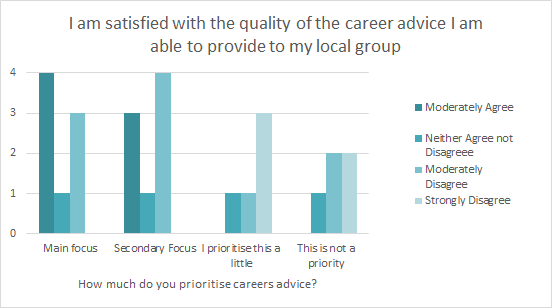
Levels of satisfaction were mixed amongst respondents whose main or secondary focus was career advice - 44% moderately agreed but 37.5% moderately disagreed. No respondents strongly agreed that they were satisfied with the quality of career advice. Those who didn’t prioritise career advice (“I prioritise a little, this is not a priority”) were more consistently dissatisfied. Many of these respondents did not say career advice was unimportant, rather their main reason for low prioritisation was a lack of competence/knowledge (thus explaining their dissatisfaction).
Paid organisers are overall more satisfied with the career advice they provide, but when isolating this variable, the distribution of satisfaction is quite similar (although it’s hard to generalize from the small sample size). There appears to be a non-trivial relationship between time spent on career advice and overall satisfaction with the quality of career advice provided. However, there is still a lot of room for improvement, even amongst paid organisers.
We also checked whether there were differences in satisfaction between paid organisers and between organisers from non-US & UK regions, but didn’t find significant ones. It appears that the level of prioritisation is the more important factor.
Limitations of the data
Small sample size: We cannot generalize these observations to all countries with EA presence or EA groups due to interviewing only 27 groups. But, we think we can:
- Understand national-level issues and take educated guesses on the extent to which they apply to groups in similar region(s)
- Identify issues that national groups may be particularly interested in and are able to solve. We believe national groups are well-placed to address national/regional career advice issues.
- Eliminate less promising interventions
Sample Biases: In order to understand the extent of the sample biases, we asked respondents the following questions to generalizability of their answers:
| Question | Purpose |
| Full, part-time or volunteer status | Respondents who’ve spent more time would likely have a better understanding of their members & their own challenges. |
| How much they prioritised career advice | Respondents who prioritised career advice would likely have more accurate or extensive knowledge on challenges their members faced, and we should give more weight to their answers. We didn’t end up doing this, because organisers who prioritised career advice less made fewer points about their members’ bottlenecks (which we cover in the second post). |
| The type, age and size of their group | To help identify challenges that may result from demographic properties rather than a generalized challenge |
| How well they knew their members | We checked the response to this question against the previous questions as an extra check. |
| Where they get their career advice knowledge | We asked group organisers about where they get their knowledge of career advice, but didn't find any particularly novel findings. We have moved this question to the appendix. |
Survey design trade-offs: We made some important trade-offs regarding survey design:
- We had to limit the number of questions (although the survey still took 30-60 minutes to complete for most organisers, and even longer for some)
- We had to make questions intuitive to answer, at the cost of precision (for example, we asked how prevalent a bottleneck was, rather than quantitative data such as asking for the number of people who are facing said bottleneck)
- We had to make questions sufficiently open-ended so as not to bias respondents (e.g. we asked respondents to brainstorm bottlenecks, rather than give them a common list to compare)
- We go over this in more detail in Part II on the group member bottlenecks
(Minor) Definition of successful career transition was vague: We didn’t ask respondents how they thought about or defined a successful high impact career transition. We have good reason to believe that respondents had similar definitions, based on the similarity of their answers and their perception of the top-rated bottlenecks (see detailed discussion in Part II). However, we think there is a chance that they didn’t. To illustrate this, if a successful career transition is defined as “following an 80,000 Hours priority path” (which are very competitive) then organisers might respond that their members face more difficulties than if we used a more encompassing definition, that might include other kinds of career paths. We believe that respondents had similar definitions of a successful career transitionIn any future research, we would want to ask more qualitative questions explicitly addressing any complex key terms to ensure that we account for different interpretations.
What are organisers’ opinions on the career advice landscape?
We asked organisers the extent to which they agreed with a series of statements about general and local EA career advice (incl. 80000 Hours resources)
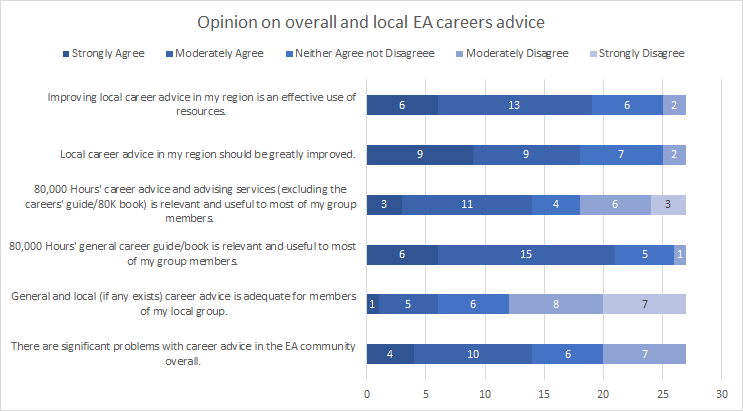
Opinions on general career advice
There is general disagreement that existing career advice is adequate for members of their local group with 55% of respondents disagreeing (moderately or strongly). This skews by geography, with 72% (13/18) of people from other countries disagreeing as compared to only 42% (3/7) of US & UK respondents.
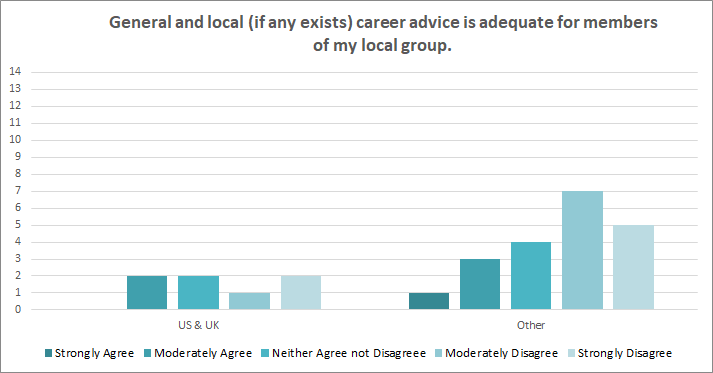
An additional 44% respondents also agree (strongly or moderately) that there are significant problems with career advice in the EA community overall. This is a more controversial view with 26% respondents moderately disagreeing.
70% of respondents agree that local career advice in their region should be greatly improved, and 67% agree that it’s an effective use of resources. There are clear differences by geography where 80% of other groups agree that local career advice in their region should be greatly improved compared to only 28% of US & UK groups. Although 71% of US & UK respondents were not sure whether local career advice should be greatly improved, 57% still thought that improving it was an effective use of resources. These questions were poorly phrased - for example, respondents may believe that there are moderate improvements to be made to local career advice, and that these improvements are an effective use of resources.
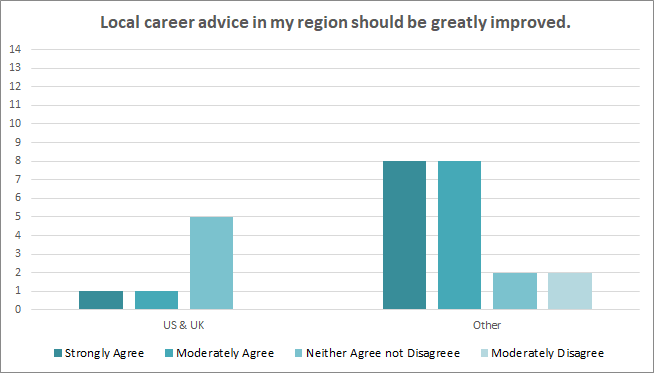
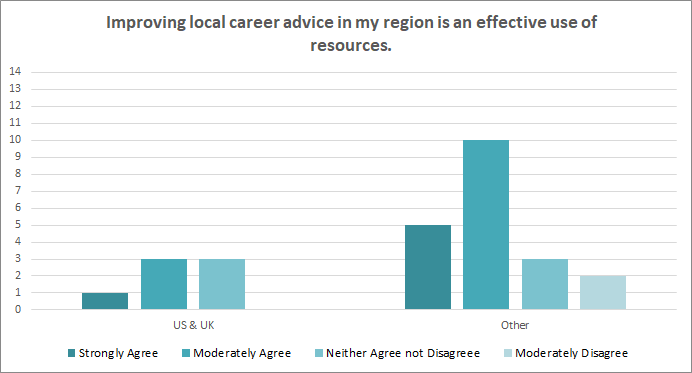
Opinions on 80,000 Hours of Group Organisers
As the most prominent source of career knowledge (see more), 80,000 Hours has a large impact on any career advice that is disseminated. Overall, respondents are positive about 80,000 Hours. 77% of respondents agree that 80,000 Hours’ general advice (e.g. the 2017 career guide) and 51% agree that 80,000 Hours’ other advice and advising services are useful to most of their members. There appears to be no strong skew by geography, similar to respondent’s evaluation of the state of general movement knowledge or career advice. One respondent mentioned that existing resources are useful, but are not sufficient beyond a certain point, which may be true for other respondents as well.
In the general comments at the end of the survey, 3 respondents offered comments and critiques on 80,000 Hours. Two mentioned that 80,000 Hours can make people feel bad about themselves or intimidate people. One critiqued the lack of applicability of 80,000 Hours’ career advice to members of their country who aren’t longtermists. All three offered suggestions, such as that people later in their career would give better advice, a suggestion to see “a streamlined path for people to take, so everyone interested in making an impact in their career can a) find suitable resources b) have a chat with someone who can help them with their decision and c) get them hooked in to the community.” A final recommendation was to bring back the career guide and add upon it to “bring EA-related thinking to a wider audience”, and to create localized versions of the 80,000 Hours career guide with locally relevant career paths for their country. They made a caveat, saying that the “this localized content would be limited by the skills/talent of people reading it, and the opportunities available to them.”
What challenges do organisers face?
We asked group organisers which of the following factors was either enabling or limiting their ability to provide high quality careers advice.
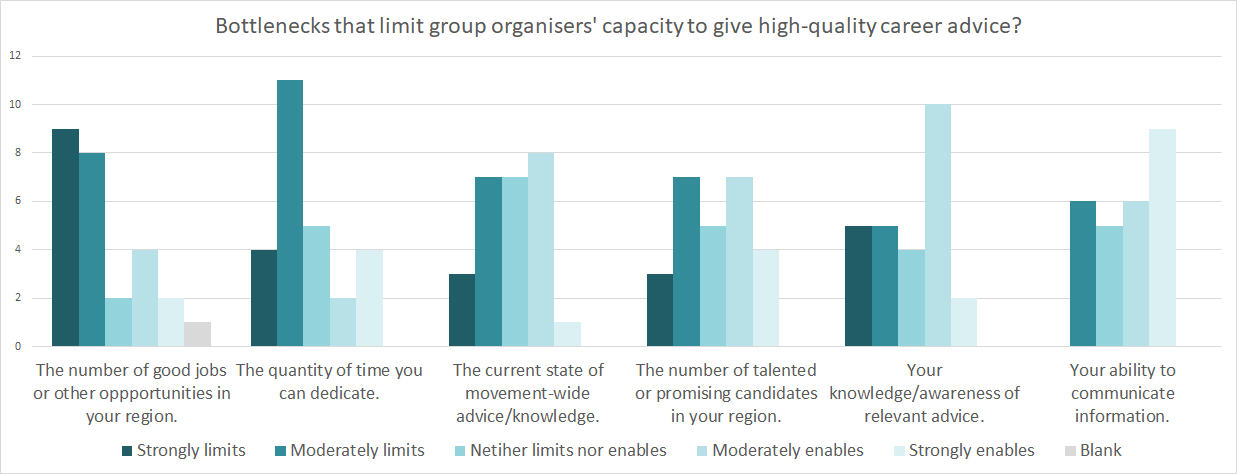
The top 3 factors that limited organisers were:
- Responses were divided by geography on the number of good jobs and opportunities in their region (as might be expected). 89% *(16/18) of other respondents said it moderately or strongly limited them. Conversely, 85% (6/7) US & UK groups stated this strongly or moderately enabled them.
- Quantity of time was a limiting factor for 55% (15) of respondents. There was a split even amongst full-time employees, 50% stated it strongly enabled them, while 50% (3) found it moderately or strongly limited them.
- The current state of movement-wide advice/knowledge had split responses with no distinct difference by geography.
- There were split responses for talent, with approximately 50% citing talent as a limiter and enabler. This seems to vary widely on a group-by-group basis. However, it’s hard to read too much into these responses because we didn’t specify how candidates define “talented or promising candidates”. If organisers were thinking of very competitive paths then it’s possible they might have overestimated how much this factor limits them. (See the Limitations of the Data section for more on this). The most we can say is that it is not as clear a barrier as the others discussed above.
The top two enablers were:
- organisers’ own knowledge/awareness of relevant advice: 12 (44%) of respondents viewed as a moderate or strong enabler
- own ability to communicate information: 15 (55%) of respondents cited this as a moderate or strong enabler.
Given that the top 4 barriers are situational factors (quantity of time can be outside a respondents’ control if they have other responsibilities or obligations), while the top 2 enablers are dispositional factors, respondents may be exhibiting self-serving bias. However, based on respondents’ other comments & responses, we believe that this is not a case of self-serving bias because respondents highlight specific ways the situational factors are bottlenecks, and their observations agree with previous discussion of this topic on the EA Forum,
From the general comments section, 3 respondents mentioned that EA doesn’t have actionable advice for most people. Reasons given were that because EA is targeting a niche and elite group, there is a lack of resources for people who aren’t “excelling to that level and [aren’t] maths / computing focused”. 2 respondents mentioned a lack of non-US and UK specific advice, one saying that “sometimes people are just chasing the few high-status career paths without exploring whether their personal niche could be somewhere else”, and another mentioned that although they were a UK university group organiser, many group members were from other countries and there was a lack of advice for them, especially Singapore and Germany.
What suggestions do organisers have?
We asked group organisers what things they thought would help address the career advice challenges they faced. This was an open-ended question and all responses were generated by respondents. We categorised the responses and created the summary chart below.
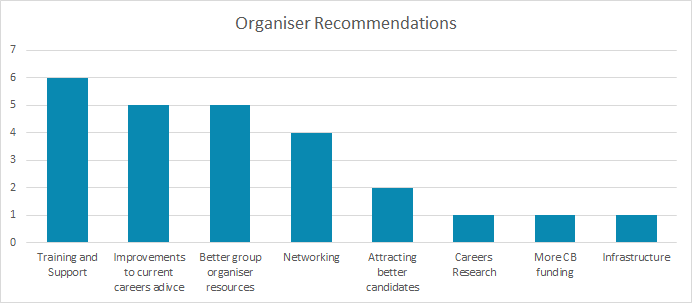
CB = Community Building
We also included a summary of the unique suggestions per category for the top four categories to give examples of what respondents specifically requested in the appendix.
What is organisers’ evaluation of different career activities?
- Career 1-1s were the most useful activity and were most often ranked moderately useful.
- Career workshops or events were the most attended activity, but were most often ranked somewhat useful.
- Identifying and getting the right target audience to events was important to make an event effective.
- Group organisers were often unsure of their impact on actual career plan changes due to a lack of follow-up with participants.
We have chosen not to publish the write-up on career events to save time, however you can view the full write-up in a less polished form here.
Other posts
- Career Activities Evaluation
- Community Members’ Bottlenecks (upcoming)
Appendix
More on Group Demographics
The following table shows some common demographic information that may be useful as a reference point between this survey and the EA Groups survey.
| Factor | This Survey 2020 | EA Groups Survey 2019 |
| Number of groups | 27 | 176 |
| Number of countries | 15 | 40+ |
| Median age of group | 4 years | 3 years |
| Founded in last 2 years | 26.0% | 43.2% |
| City groups | 33.3% | 44.3% |
| National groups | 33.3% | 11.9% |
| Student groups | 33.3% | 37.5% |
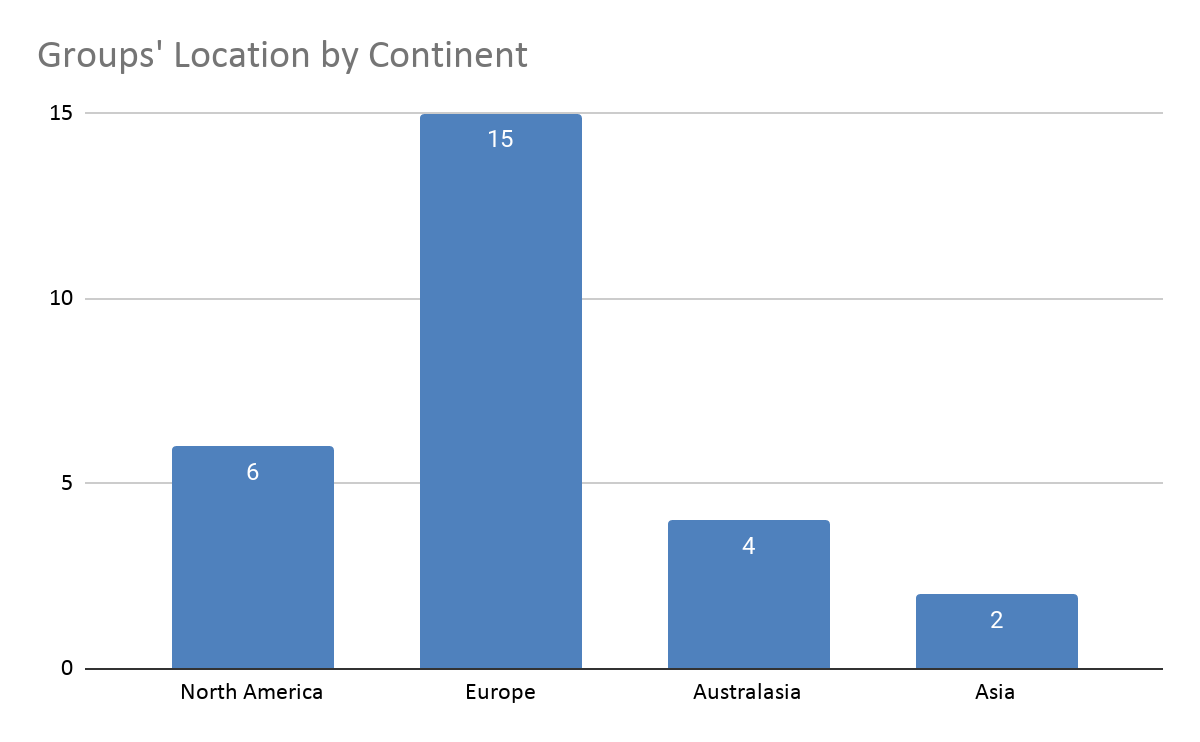
More on Career advice prioritisation
Main focus
Comparative Advantage 2 members mentioned that members couldn’t learn about careers advice as easily as other activities like learning about EA. 1 person said that because they were a longtermist and many of their members were students or early-career, so careers advice was a better strategy than encouraging donations.
Other 1 person mentioned that career advice was a good starting point to “build up all other EA knowledge around for most people”. Other reasons mentioned was that career advice was neglected locally.
Secondary Focus
Focus on building members’ EA knowledge 3 people who mentioned this was a secondary focus, said that this was the case because they wanted to first make sure their members developed an understanding of EA first. One mentioned trying to do career advice without an understanding of EA wasn’t successful for them, and one mentioned that despite focusing on EA concepts, they still send people to EA Oxford’s EA Student Mentoring program.
Focus on Community Building 2 people mentioned prioritising community building over careers advice. One mentioned wanting people to feel comfortable in the group before getting careers advice, another community sustainability.
Lack of demand 1 person mentioned a lack of interest in career advice from their members, and another said that career advice was one of their main focuses, but not a standout focus.
I prioritise this a little
Lack of competence and knowledge 4 people who chose these two categories cited that they don’t feel qualified or competent to give careers advice. Of these 1 also mentioned prioritising community building.
Other 2 people cited other reasons. 1 person cited community building as their primary goal since their group was new, and 1 cited a low demand for careers advising.
This is not a priority
Lack of competence and knowledge 1 person mentioned they were not very good at career coaching. Many mentioned lacking the guidance or knowledge, and at least 1 mentioned lacking knowledge on how to effectively give career advice (e.g. how to run a career 1-1).
Lack of capacity and willingness 2 mentioned they don’t want to or don’t have the capacity to do it.
Specific suggestions for improvements to career advice resources
| Category | Suggestion |
|---|---|
| Training and Support |
|
Improvement to current careers advice
|
|
| Better group organiser resources |
|
Networking
|
|
What are common sources of career advice for organisers?
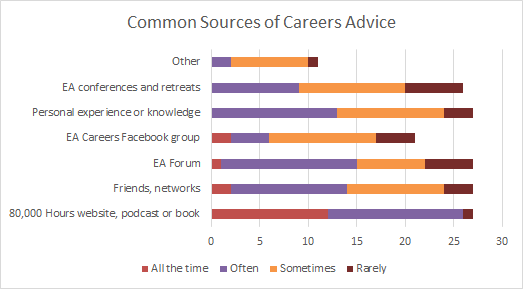
As might be expected, 80,000 Hours is the most prevalent source of career advice, with over 10 applicants using it all the time (there were no significant differences in use by geography). There is no other source that is referenced by so many people so often. If we were to re-do this survey we would have broken down the specific resources within 80,000 Hours as they fit into this rough typology of career advice, to figure out which kinds of career resources are the most useful. We will discuss comments from respondents on 80,000 Hours in the next section.
The breakdown of sources like friends, networks and the EA forum is roughly the same, with 1-3% using them all the time, 11-13% using them often, and 7-10% using them sometimes. Personal experience and knowledge, and conferences and retreats are slightly less frequently used than friends, networks and the EA forum, but this difference is very small and likely insignificant.
The EA Careers Facebook group is used less than other sources. This may be because it’s more useful for people to get advice on their own career plans, rather than a place where group organisers can get information to help their members.
We also let respondents mention other resources (the “Other” category) not mentioned above. These responses included experts and experienced people, other EA resources, podcasts, books & blogs and locally specific resources. See below for the detailed list.
Other sources of career advice
Experts and experienced people
- Advice from professionals in other movements or communities
- Directly asking older, successful, EA sympathetic people in my country
- I often refer people to experts in their field, and some senior EAs in Berlin have kindly agreed to do 1-1's every now and then
Other EA resources
- Effective Thesis for students
- Clearer Thinking decision tools for hard career choices
- Reddit, StackOverflow, Online Search
- EA Work Club
- Other books & media in EA
Podcasts, books, blogs
- Various podcasts, blogs and books (specific examples given below)
- The Tim Ferriss Show - he interviews top performers, and there's a lot to learn about productivity and career strategy there.
- The book "Designing Your Life" by Bill Burnett and Dave Evans is something I also recommend and use.
Locally specific resources
- Norwegian career websites
- Office of career strategy
It will be harder to track the quality and sources of non-80K knowledge, since at the time of this survey, there was no clear secondary source of knowledge, instead there are multiple sources used at approximately the same frequency. Centralising non-80,000 Hours EA career advice resources could be useful in making information shared via networks or friends more efficient, but it is unclear what the next steps are.
MaxRa @ 2021-02-04T23:58 (+5)
Cool, thanks for shining light on this! My local chapter is currently also trying to get started with some career support and we also struggled with coming up how to do this best. I think we all relate to not feeling knowledgable or competent enough to give significant career advice ourselves. Instead, we now will host a career co-working session every six weeks. The idea is to give people space and an occasion to work on anything they think is most useful and have people around that can help out with ideas and feedback.